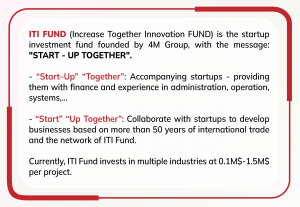Some Policies to Foster Startups in Vietnam and Beyond
Tuesday, 06/09/2022 09:00 (GTM +7)
Entrepreneurship is an inevitable trend globally, especially in the context of innovation and sustainable development being increasingly emphasized. Therefore, governments in Vietnam and many countries worldwide have issued many practical support programs for startup businesses.
In this article, ITI Fund will review some of the direct incentive policies of the government, such as tax incentives, cash subsidies, indirect support through infrastructure investment, providing funding for startup incubators, etc.
Preferential Tax Policy
Around the world, including India, startups that develop or commercialize innovative and intellectual property products will receive a 100% deduction of profits from business operations in the tax year. In China, startup businesses with an annual income of no more than 200,000 yuan are subject to a preferential income tax rate of 20%, lower than the average tax rate of 25%.
In Southeast Asia, the Thai government has issued Decree No. 603, allowing for tax exemptions and reductions on income tax for SMEs that innovate in technology and meet specific conditions. Additionally, to encourage startups to transition to digital, the Malaysian government provides a 100% exemption from corporate income tax for five years or a 60% tax deduction on total capital expenditure.
How about Vietnam?
Việt Nam also offers various incentives at different times with different objectives, such as attracting foreign investment, promoting the development of priority sectors, creating job opportunities, increasing domestic production, boosting exports, or developing science and technology. Some typical policies include:
Preferential Corporate Income Tax Rates
Currently, corporate income tax is a direct tax that affects the finances of startups, and therefore, state support primarily comes in the form of this tax.
According to Article 13, Clause 1 of the 2008 Law on Corporate Income Tax (amended and supplemented in 2013, 2014), startup enterprises may be eligible for a preferential tax rate of 10% for 15 years in exemplary fields such as scientific research and technological development, application of high technology, construction, business incubation, and venture investment for growth in priority areas as stipulated by the Law on High Technology; software production, and other sectors.
In addition, the government is also considering and implementing other support policies such as tax exemptions and reductions, capital support, training and development of human resources, and creating opportunities for startups to access new sources of capital and markets, thereby helping startup enterprises to develop sustainably and make positive contributions to the country’s economy.
Incentives on Exemption and Reduction of Corporate Income Tax
In addition, if the income is classified into the fields above, innovative startup enterprises may be exempt from tax for four years and receive a 50% reduction in the amount of tax payable for the following nine years, according to Article 14, Clause 1 of the 2008 Law on Corporate Income Tax (amended and supplemented in 2013, 2014).
Furthermore, under Clause 3, Article 18 of the 2017 Law on Support for Small and Medium-sized Enterprises, investors in innovative startups are eligible for tax exemption or reduction for a limited period of time-based on their investment in startups as regulated. However, the law has not explicitly defined this, so the practical benefits are still limited.
With tax incentives for innovative startup enterprises, although it may reduce the budget revenue in the short term, in a long time, it will help startups enhance their accumulated capacity and competitiveness, thereby promoting economic development and creating other “spillover effects” for the economy.
Cash and Related Expenses Allowance
The EU countries have implemented quite successful capital support policies for early-stage startups. For example, in Germany, this policy has been enforced since the mid-2000s to promote innovation and help unemployed people participate in the labour market through self-employment.
In Asia, for example, Taiwan’s government has provided many incentives for establishing new companies or branches with funding of up to 100 million TWD. At the same time, Singapore has many cash subsidies to encourage startups to access capital more quickly and conveniently.
Recently, the Vietnamese government issued Decree No. 80/2021/NĐ-CP, and according to Article 22 of the Decree, small and medium-sized enterprises and innovative startups will be supported with many expenses and fees, such as:
- Support 100% of the cost of using equipment at technical facilities, incubators, and shared workspaces, but not exceeding 20 million VND/year/business.
- Support up to 50% of the cost of renting space at incubators and shared workspaces, but not exceeding 5 million VND/month/business. The maximum support period is three years from when the company signs the lease contract.
- Support 100% of the value of the contract for management and development consulting of products and services protected by intellectual property rights in the country, but not exceeding 50 million VND/contract/year/business.
- Support up to 50% of the value of the contract for consulting on the establishment, transfer, exploitation, and protection of intellectual property rights abroad, but not exceeding 50 million VND/contract/year/business.
- Support up to 50% of the cost of testing new products at testing units and organizations for testing goods, but not exceeding 30 million VND/year/business.
- Support up to 50% of the value of the contract for consulting on completing new products, new services, new business models, and new technologies, but not exceeding 50 million VND/contract/year/business.
- Support up to 50% of the cost of participating in specialized training courses in the country for business students on product development and product commercialization, but not exceeding 5 million VND/student/year and not exceeding three students/business/year.
Financial Aid Fund
Globally, several prominent financial support funds can be mentioned, including:
- United States: The Early Stage Innovation Fund (ESIF) of the Small Business Administration (SBA) with a startup capital supplement of up to 1 billion USD over five years.
- China: The Innofund to provide specialized funding (150-250 thousand USD), interest subsidies for loans, and stock investments.
- Singapore: The Early Stage Venture Fund (ESVF) provides financial support for technology startups with a maximum total capital of 3 million SGD.
- India: A nationwide startup support program, including a 100 billion Rupi fund for investing in startups for four years.
In Vietnam, a special fund is the Youth Startup Support Fund, managed by the Ho Chi Minh City Youth Union and operated by the Youth Startup Support Center. Its primary purpose is to encourage entrepreneurial spirit among young people, with a total capital of 100 billion VND.
Development of Loan Programs
EU countries have individual loan policies that help overcome market barriers for startups to access significant capital sources at lower costs by guaranteeing startup loans to make it easier for them to borrow from banks. There are three main models:
- Public guarantee program
- Public-private guarantee program
- Private program
In Malaysia, each ministry has its loan program for startups in the field under its management, such as:
- The Ministry of International Trade and Industry (MITI) has launched the Malaysia Industrial Development Fund (MIDF) for the service sector.
- The Ministry of Finance, in collaboration with the Malaysia Technology Development Corporation (MTDC), has established the Business Startup Fund to promote the development of technology entrepreneurs and startups.
In Vietnam, Deputy Prime Minister Vu Duc Dam has recently signed Decision No. 897/QD-TTg approving the “Support for Youth Entrepreneurship” program for 2022-2030. This program includes various contents such as training and knowledge enhancement for founders, support for business development, distribution channels, and product consumption. The government also helps businesses access funding sources and financial support through various programs and incentives and builds idea exchange platforms to connect young people with investment funds.
In summary, funding is the lifeblood of businesses, especially for startups. Therefore, effectively utilizing the government’s support policies will help companies optimize costs and develop more efficiently. In addition, it is worth noting that the government’s decision also assists businesses in accessing funding sources and financial support through various programs and incentives and building idea exchange platforms to connect young people with investment funds.
Contact:
- 🌏 itifund.com
- 📞 (+84)90 998 3699
- 📩 info@itifund.com
- 🔔 FB.me/ITIFund









